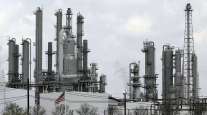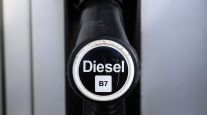Average Price of Diesel Fuel Drops 3.8¢ to $3.85 a Gallon
This story appears in the July 11 print edition of Transport Topics.
The average price of retail diesel fuel dropped to its lowest level since February last week, shedding 3.8 cents a gallon to $3.85, marking the eighth decline in nine weeks, the Department of Energy reported.
Since hitting a nearly three-year high in early May, retail diesel has dropped a combined 27.4 cents a gallon, or 6.6%, off the $4.124 peak. However, trucking’s main fuel is still 31.7% higher than a year ago, when it was $2.924 on average.
The gasoline average broke a streak of seven consecutive de-clines, rising by a half-cent a gallon to $3.579. A year ago gas stood at $2.726, said DOE’s Energy Information Administration.
Crude oil futures in New York rose by about $4 a barrel from the previous week, closing at $98.67 on July 7.
“This is a bit surprising, with prices coming down in the summer months, when they usually rise, but it’s an absolute blessing,” said Steve Benninghoff, chief operating officer of KKW Trucking, Pomona, Calif.
KKW’s home state has the highest prices in the nation, in part because it uses a special blend of diesel for environmental reasons. The EIA survey said the California average dropped by 8.1 cents a gallon over the week to $4.065, and that it topped $4.45 a gallon in early May. Benninghoff said his sales people all drive hybrid cars. As for his trucks that do regional truckload work, the diesel price decline allows his fuel surcharges to catch up.
“When fuel rises steadily, there’s a lag on the surcharges and you’re behind the eight ball, but since prices have been dropping we’re pretty good now,” he said.
The Gulf Coast is the bargain basement for fuel, with a $3.798 average.
Management at Ruan Transport Corp. said there is an unhappy see-saw relationship between business and fuel prices.
“We’ve been bullish on the economy, but that means more demand for energy, including higher fuel prices,” said Ruan’s controller, Randy Ambrozic. He was hesitant to predict a price pattern for the next six-to-12 months, but said the Des Moines, Iowa, dedicated contract carrier uses a variety of strategies for dealing with risk, including financial hedging sometimes.
“We’re not speculating. We’re just trying to take out some of the risk and make prices more predictable,” Ambrozic said.
In more standard industry tactics, he said Ruan has tightened its maintenance procedures to ensure better mileage, buys fuel in bulk for its terminals, cuts deals with truck stops to lock in better prices and makes sure that fuel surcharges are up to date.
“We can’t carry all of the risk of fuel prices. They’re volatile and we have to shift some to shippers,” Ambrozic said.
Benninghoff of KKW said his company is stressing auxiliary power units to reduce engine idling and low rolling-resistance tires to improve mileage. He also cautioned that fuel surcharges do not completely isolate carriers from high prices as not every mile a truck travels is billed to a shipper.
The retail diesel average was below $3 as recently as Sept. 27, when it stood at $2.951. The following month, fuel began its seven-month spike to more than $4 a gallon.
Gasoline followed a similar path, but its high point was $3.965 on May 9.
Bloomberg News said the increase in crude prices stalled somewhat on July 6 after China’s central bank raised interest rates and Moody’s Investors Service downgraded Portugal’s credit rating, heightening concern economic growth will slow and crimp fuel demand.
“China’s rate increase will be bearish in the long term,” Kyle Cooper, director of research for IAF Advisors in Houston, told the wire service. “It should eventually slow economic growth and curb fuel demand. All of the recent growth has come from emerging economies such as China.”
The United States and China were responsible for 32% of global oil demand in 2010, according to BP PLC’s Statistical Review of World Energy, Bloomberg reported.
The lowest close for Nymex oil over the past 12 months was $71.63 a barrel on Aug. 24.




